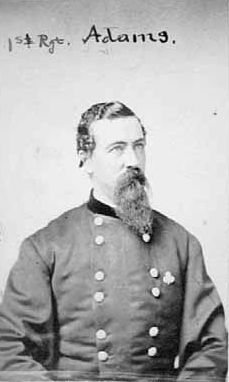
Learning from Gettysburg:
Charles Powell Adams of the 1st Minn
Lt Col Charles Adams of Hastings Minnesota didn’t know how to die.
On July 2nd, 1863, at around 7 pm, Charles Adams took his position behind and to the right of Col Wiliam Colvill, commander of the 1st Minnesota. Together they helped lead the famous charge of the 1st Minn down that soon to be bloody slope of Cemetery Ridge — 262 Minnesotans against the 1700 Alabamians under Cadmus Wilcox.
Hancock had told Col Colville of the 1st Minnesota to buy him 10 minutes. “Advance, colonel, and take those colors.” Without hesitation, Colvill ordered “Forward, double-quick.”
Every man realized in an instant what the order meant, death or wounds to us all; the sacrifice of the regiment to gain a few minutes’ time and save the position, and probably the battlefield. And every man saw and accepted the necessity for the sacrifice.
Before long Colville fell and Adams took command. But a fusillade of Confederate bullets soon struck him down as well. Shot twice in his left leg, Adams fell as the third minie ball entered his left breast, passed thru his lung and exited near his spine.
As darkness set, survivors of the 1st Minn returned to the field, found the wounded Adams, but judged his wounds to be mortal and left him to die on the field. A physician in civilian life, Adams kept his multiple wounds clean by constantly pouring water over his wounds during the night.
Still alive on the next morning, he was finally taken to the rear and into crowded Union hospitals. There the doctors saw his wounds as mortal and triaged him out, leaving him outside the hospital tent to die in the thunderstorms and flooding of July 4th.
Adams still wouldn’t die.
Finally getting hospital care, Adams slowly recovered and returned to take command of the 1st Minn until its remnants were mustered out.
Not done, Adams volunteered to serve til war’s end with Hatch’s Battalion, Minnesota Volunteer Cavalry.
Cancer finally got him in 1893.
P.S. Hancock would rightly affirm the sacrifice of the 1st Minn when he said: “No soldiers on any field, in this or any other country, ever displayed grander heroism.”